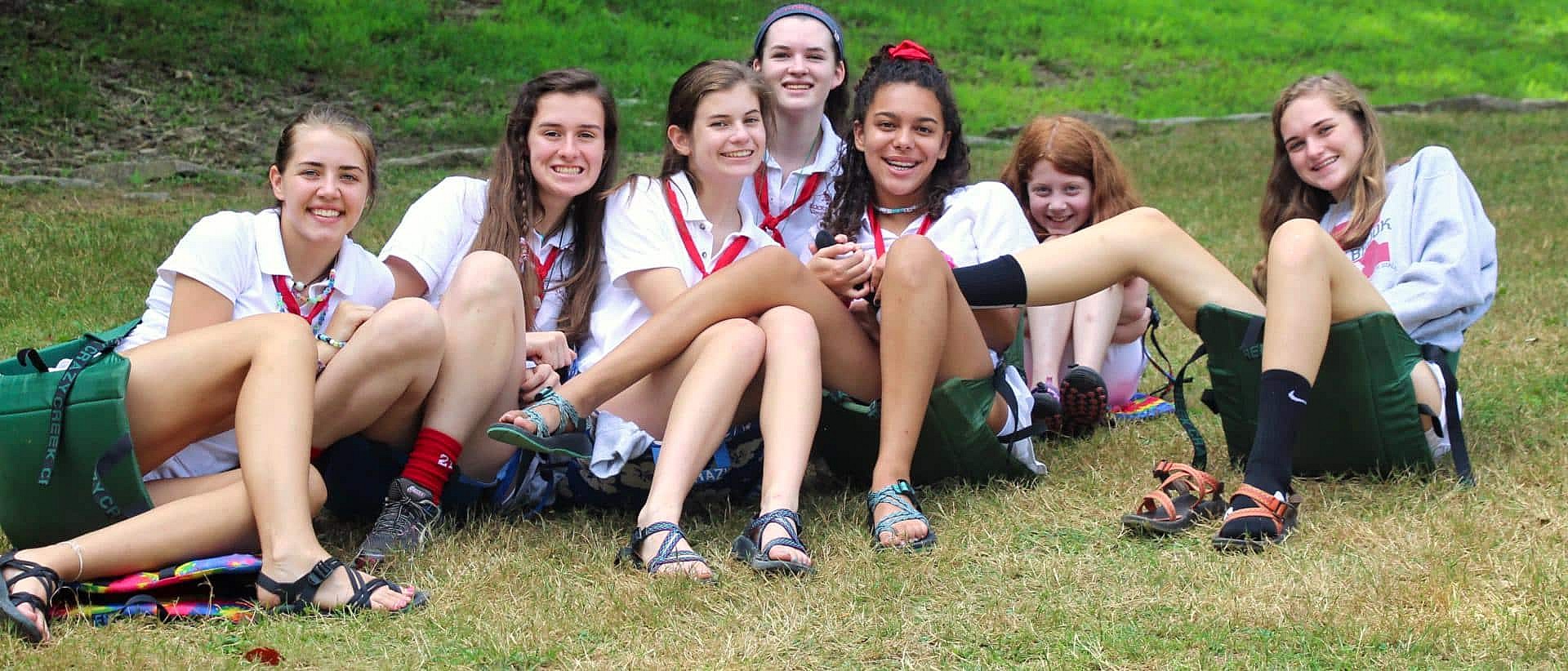Social-Emotional Learning: A Whole-Child Approach
Since 2017, Rockbrook Camp has made available paid internships designed for students actively pursuing careers in youth related fields (e.g., Education, Psychology, Child Development, Social Work, etc.). Focused on social-emotional learning (SEL), this program provides student interns hands-on experience directly applicable for working with youth in the classroom, nonprofit, state/federal, and other environments.
Set in the residential community of Rockbrook Camp for Girls, in Brevard, NC, interns serve as cabin counselors and live with a small group of children, interacting with them continuously, and helping them navigate the social and emotional landscape of a small community. Interns have the opportunity to observe, research and apply techniques on a topic of their choice, such as emotional triggers, engaging with diversity, managing conflict, inter- and intra-personal interactions, and other cognitive milestones.
The internship begins with a week-long, staff orientation and training that introduces interns to a range of strategies for meeting the social and emotional needs of children, as well as what it means to be a cabin counselor at Rockbrook Camp. Interns devote their second, third, and fourth program weeks to helping improve children’s self-awareness, self-management, social-awareness, and relationship skills. Interns focus on an on-site case study in their fifth week, and spend their final program week preparing a presentation to peers and program leaders.
Throughout the internship, interns meet weekly with an internship advisor and mentors to review their week’s work, discuss issues, and share ideas that will grow their developing identities as Youth Development professionals.
Rockbrook’s SEL Internship also provides the flexibility to be structured in accordance to specific college/university internship requirements for those who are pursuing college credit.
Internship Roles and Responsibilities
Week One: Overview, Training, Assumptions and Expectations
The internship begins with a week of training before being placed with children. This training introduces student interns to the core principles and concepts of socio-emotional learning in the context of a residential camp community. It asks interns to reflect upon their personal points of entry into the professional field of education, and includes self-examination of personal assumptions, expectations, and beliefs about a social-emotional approach to working with children.
Week Two: Self-Awareness, Self-Management: Understanding Internal Emotional Agency and Emotional Triggers
Interns begin their first week of observation by immersing themselves into children’s’ daily routines, activity schedule, meal times, and cabin life. Interns record social processes in a daily journal as they unfold throughout the day. Records will pay special attention to children’s anxieties, as well as children’s emotional triggers and responses to these triggers. This week ends with a meeting between the interns and their on-site advisor to discuss initial responses to the role of emotions in teaching and learning.
Week Three: Social Awareness, Relationship Skills: Understanding External Emotional Agency, Responding to Diversity and Engaging with Conflict
Interns spend their second week of observation continuing to immerse themselves into children’s daily routines and recording social processes in a daily journal. This week’s records should pay special attention to social interactions between children and the functioning capacity of the group. This week ends with a meeting between the interns and their on-site advisors to reflect upon the methods, dialogues, and resources utilized to create a mutually caring environment among children.
Week Four: Responsible Decision Making
As interns continue to employ social-emotional learning strategies founded in the first three weeks of program work, they now expand the scope of their investigations beyond their immediate group of children and into the community at large. Interns use this week to shadow and interview several educational leaders on site. Interns should inquire about the range of professional techniques used to motivate children to make responsible decisions.
Week Five: Case Study and Application to Research and the Classroom
Interns spend their fifth program week exploring a specific child’s emotional and self-regulatory experience within the community. Interns should consider the child’s baseline emotional needs upon entry into the community and any resulting progressions from previously employed and current social-emotional supports. After critical synthesis, Interns should consider possible support strategies that will benefit the child in the future. Interns couple their case-study consideration with exploratory research focused on current educational trends. Through a series of readings (see further reading), interns should expand their understanding of how non-cognitive skills are already being cultivated in schools. Interns utilize this week to consider how these practices may transpire in their own classrooms.
Week Six: Evaluation and Presentation of Culminating Portfolio
Interns devote their final program week to a two-part reflective practice: an open presentation to peers and educational leaders and a final formal evaluation.
Internship Parameters
- This internship will take place at Rockbrook Camp for Girls, a residential summer camp located in Brevard, North Carolina.
- Interns will live on-site, immersed in the lives of children, 24 hours per day, six days per week for a total of ten weeks.
- Interns will have daily opportunities to teach a skill activity.
- This internship is paid. Interns will receive payment at the end of the internship term.
- Rockbrook will provide interns both food and lodging.
- Training will be provided on-site.
- A contract, agreed upon by the intern, the intern’s academic advisor, and Rockbrook’s hiring and executive directors, will be signed before the internship begins.
Eligibility:
- Minimum 18 years of age.
- At least one year of participation within an education major or related program. Past interns have majored in Education, Psychology, Social Work, Child and Family Counseling, Childhood Development, and Pediatric Medical specialties.
- Previous practicum experience with children preferred but not required with prior approval from an academic advisor.
Summer 2025 Dates:
- Sunday June 1, 2025 – Monday August 11, 2025
Application Process:
Internship candidates must complete an online Internship Application. The application includes a series of essay questions and four professional references. A recommendation from the candidate’s academic advisor is required.
An interview is also required.
For more information:
1. Download this detailed description (.pdf): Education Internship.
2. Contact Us.





